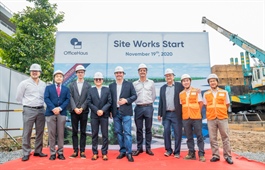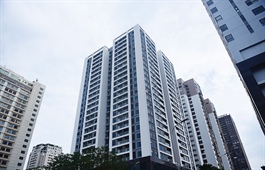M&A remains favorite channel for real estate developers in Vietnam
M&A remains favorite channel for real estate developers in Vietnam
More transactions are expected to happen in the near future if market transparency improved and flexibility from investors becomes stronger.
Real estate businesses continue the traditional channel of the capital market through merger and acquisition (M&A) activities depite slowdown in the first three quarters this year, said real estate and investment management firm JLL.

M&A remains traditional channel for real estate developers. Image: iStock
|
The sentiment has been fueled by the government’s efforts to improve market transparency by investigating legality of real estate projects, land origin, lack of transparency in land allocation, and violations of legal regulations, according to Khanh Nguyen, Senior Director of Capital Markets, JLL Vietnam.
For that reason, investors could find more investment opportunities with some notable transactions as follows:
(1) Participating in auction directly with the government: For example, the Ho Chi Minh City People's Committee has just approved for Department of Natural Resources and Environment (DONRE) to auction 9 plots of land in functional area 1 in Thu Thiem. Previously, in May 2020, the HCMC People's Committee also approved the proposal of the DONRE to auction the 38.4 ha resettlement land located in the Thu Thiem new urban area project, Binh Khanh ward, District 2.
(2) Buying assets through the Vietnam Asset Management Company (VAMC) or a commercial bank that has collateral which is in the bad debt portfolio (non-performing loan) of the bank. For example, the debt of more than VND4,000 billion (US$173 million) at the Kenton Node project is being auctioned by BIDV Bank.
JLL observed that these investment channels are not unfamiliar to investors, however, due to the lack of information and legal transparency in previous years, very few assets have been successfully acquired.
With liquidity problems that arise from suspension of and/or investigation into projects, real estate developers are more actively approaching these aforementioned methods.
There are still many challenges, both subjective and objective but JLL believes there will be more transactions happening through this investment channel in the near future if the market witnesses improved transparency, more disclosure of a portfolio of assets, return of high investment, stronger bank support and greater flexibility from investors.

Khanh Nguyen, Senior Director, Capital Markets, JLL Vietnam
|
M&A landscape
Real estate M&A transactions in the first nine months this year recorded a slowdown in quantity due to both subjective and objective reasons.
Amongst the transactions recorded this year, however, there are some significant deals in terms of value (more than US$500 million each) coming from well-known global investors whose assets under management (AUM) worth multi-billions.
JLL observes that many Vietnamese developers are raising capital for large-scale development porfolios that are attractive to investor because of the size of cash flow, high returns and growth potential of an emerging real estate market like Vietnam.
Although these transactions are still under negotiation and legal review, this is still considered a positive factor for Vietnam real estate market because of foreign investors' confidence in the market recovery and improvement of buyer purchasing power in the coming quarters.
JLL believes that the cost of capital for Vietnamese developers will tend to increase in order to compensate for a greater risk as Covid-19 is affecting the global economy and Vietnam is no exception.
This can be seen as many local developers have experienced difficulties in accessing commercial bank loans, even though the lending interest rates have decreased compared to previous years. However, commercial banks also place great emphasis on credit quality, hence a number of real estate busineses cannot satisfy these loan conditions.
Real estate businesses have instead found alternative ways to access funding through corporate bond issuance with cost of capital mobilisation ranging from 7.9% to 13% for real estate industry, average 10.5% for 3-5 years term. Some real estate businesses offer 13% rate (excluding capital arrangement costs), which is twice as high as the current deposit rate at commercial banks at 5.3% - 6.0% for 1 year term. This could be become a pressure for businesses to manage the capital effectively when using financial leverage.




























